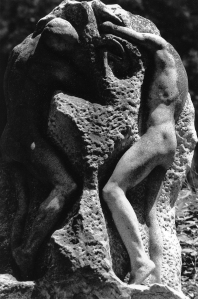Vocal Pedagogy; an Additive or a Subtractive Art
The way you answer this question is the way you teach. I’ve argued for both sides of the question, depends who’s asking. On the one hand it often feels like the voice lesson mainly consists in evoking natural functions, eliminating the accumulated helping tensions (which are no longer ‘helping’), thus allowing the organic instincts of the singer to come to the fore. On the other hand a voice lesson at times feels like I am ‘conditioning’ the student to establish healthy habits which no amount of ‘instinct’ could, by itself, ever bring forth.
I have a good singer friend who maintains that singing (especially opera) is at core unnatural. In some ways she’s right. Doing what we do for hours at a time in rehearsal and performance has no parallel in most definitions of ‘natural’. Still, I often think that even if it is unnatural in that sense, it docks on natural processes, if you’re willing to include the more dramatic emotional expressions ‘natural’. I’m speaking here of processes which are mostly of relatively short duration: spontaneous, hearty laughter, whole body authentic rhythmic weeping, vomiting, making yourself heard over a noisy crowd, spontaneous shouts of warning, Kiais of aggression, military tones of command, cries for help over great distances….like that. I believe we are ‘naturally selected’ to do this especially well for some very good evolutionary reasons. How much of this is learned behavior and how much is instinct and evocable?
I heard a story once which is appropriate here. Someone once asked Michelangelo how he approached sculpture. His reply was that he simply removed everything from the marble that didn’t need to be there! There is something valuable here for speakers, for singers and for teachers. Assuming a ‘normal’ physical and mental development (a large assumption, I know!), the ‘functions’ of the voice all have a natural context. When we turn the light of consciousness on them and repeat them, the ensuing training effect could make this seem unnatural. As unnatural perhaps as a full twisting double layout salto?....or running an ultra-marathon?....or static apnea for 10 minutes? All these examples and so many more are examples of natural functions, trained and executed to perfection.
One of the etymological roots of the word EDUCATION comes from the Latin educere, ‘to lead out from’. In one sense, this is always true. In another it isn’t. In questions of style and tradition, for example, there is little or no ‘leading out from…’. Knowing Verdi’s birthday cannot be evoked by an internal function, to use an obvious example. Making a cognitive distinction between Legato and Larghetto on the verbal level is also conditioned learning. A physical, sensory understanding of the same distinction, however, IS education in the etymological sense. So in its essence the word refers to that which Michelangelo is evoking; strip away the non-essentials, as evidenced BY THE STUDENT (as opposed to the teacher’s ideas of ‘method’) and growth, learning and advancement will proceed in its time.
Evan Bortnick Wiesbaden
